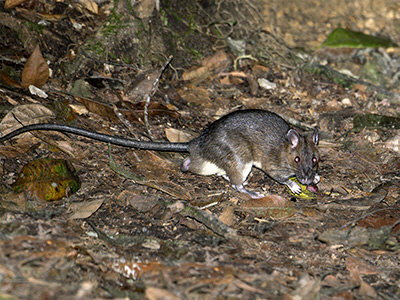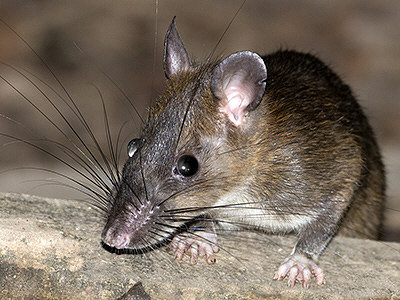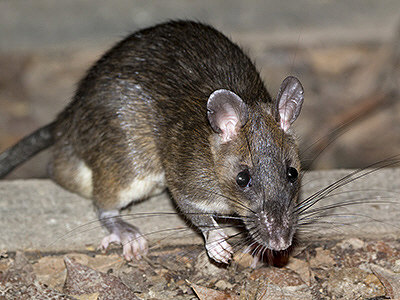
Fig 1

Fig 2

Fig 3
|
Order : RODENTIA
Family : Muridae
Species : Leopoldamys ciliatus
Head-Body Length : up to 26 cm
Tail Length : up to 39 cm
Weight : up to 400 gms
The genus Leopoldamys
are a distinct group of rats known as long-tailed giant rats. IUCN (Aplin,
2016) list 6 species of such rat, all of which occur in Southeast Asia. These are
large rats, with very long tails, smooth fur and narrow, elongated skulls.
The Sundaic Mountain Rat is typical of the genus - its body form is long and
relatively slender, and its tail is around 1.5 times the head-body length.
This is a nocturnal mammal, which inhabits montane and lower montane forests
typically above 1000 metres, although there are some records at lower
altitudes at around 600 metres. Although its altitudinal range somewhat overlaps
that of the Long-tailed Giant Rat
Leopoldamys sabanus, a closely-related lowland species, it is apparently
unusual to find both species living alongside each other.
It appears particularly common where there are numerous crevices and exposed
tree roots beneath which it can search for food and take shelter when
needed. It is mainly terrestrial, but may climb onto low shrubs and
branches, and its nests have been recorded in tree holes up to 2
metres above the ground.
Its fur colour is dark brown on the upperside, flanks and head, and
yellowish white to white on the belly. There is strong demarcation between
the dark brown fur and white fur on the lowermost part of the flanks. Some
specimens reportedly have a dark patch on the chest, either grey or brown,
which is absent in the specimen shown here.
It has an omnivorous diet which includes various fruits, vegetation and
insects.
This species only occurs in mountainous parts of Peninsular Malaysia and
Sumatra.
Figs 1 to 3 : Male specimen from Fraser's Hill, Peninsular Malaysia, at an
elevation of 1250 metres. Despite being a wild forest rat, this individual
was easily attracted to small fruits, and appeared unconcerned about the
close proximity of the photographer.
References :
Aplin, K. 2016. Leopoldamys ciliatus. The IUCN Red List of Threatened
Species 2016: e.T136691A22434736.
Pimsai, U., Pearch, M. J., Satasook, C., Bumrungsri, S., & Bates, P. J.
Murine rodents (Rodentia: Murinae) of the Myanmar-Thai-Malaysian peninsula
and Singapore: taxonomy, distribution, ecology, conservation status, and
illustrated identification keys. 2014. Bonn Zoological Bulletin
63 (1): 15–114
|